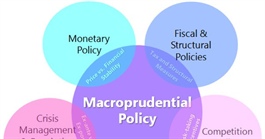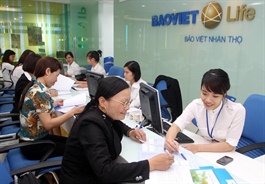Credit room management at banks under pressure
Credit room management at banks under pressure
Vietnam has controlled inflation at 2.25% in the first five months of the year, but inflationary pressure in coming time is very large. Therefore, monetary policy management, including credit room control, needs to remain cautious.
Illustrative photo. |
In a talk with Saigon Investment, Mr. PHẠM CHÍ QUANG, Deputy Director of the Monetary Policy Department of the State Bank of Vietnam said that credit room management at their bank is already under great pressure.
JOURNALIST: - Sir, what is your opinion about the fact that some commercial banks have just proposed to the State Bank of Vietnam to allow expansion of credit room due to actual needs?
Mr. PHẠM CHÍ QUANG: - The fact is that many commercial banks have not used up their allocated credit room. Until 9 June, credit had increased by 8.15% compared to the end of 2021, quite far from the credit growth limit that the State Bank of Vietnam has granted to credit institutions this year at 14%. The State Bank of Vietnam is still monitoring data from each credit institution on a daily basis. There may be credit institutions that are almost out of room, and of course there will be a justification towards consideration and granting of credit room to more priority customers. We think this is the period when it is necessary to eliminate favouritism to ensure that credit institutions focus their capital on more priority areas and high-quality loans.
Statistics of the State Bank of Vietnam of the last three years have shown that the credit growth demand of registered commercial banks is always approximately around 20%, far exceeding the capital supply capacity of the economy. So, the large capital demand exceeding the credit room is not new. If commercial banks are allowed to grow credit according to demand, the pressure on inflation will be huge. Moreover, banks will have to race to increase deposit rates, leading to an increase in lending rates and bad debts. This is also the reason why the State Bank of Vietnam must apply a credit room.
In fact, every year, the State Bank of Vietnam sets credit growth targets from the beginning of the year, but they all make flexible adjustments depending on market developments, the macro-economy, and the health of each credit institution. With priority areas, the State Bank of Vietnam prioritises credit institutions with higher ratings and classifications. In addition, the State Bank of Vietnam adjusts to increase credit levels for credit institutions participating in restructuring weak commercial banks and people credit funds. The State Bank of Vietnam also introduced a minus point for credit institutions that are regularly warned to participate in this field.
- Sir, there is an opinion that it is time for the State Bank of Vietnam to abandon the current administrative policy of credit room management. What do you thinkabout this issue?
- This is not a new issue, nor is it the first time it has been raised. The State Bank of Vietnam has explained this many times. At the recent session of the National Assembly, the Governor of the State Bank of Vietnam also explained this policy in detail when questioned by National Assembly deputies. In fact, since 2011, when the credit room management was implemented, this policy has shown to be effective.
On the other hand, in addition to applying the credit room mechanism, the State Bank of Vietnam has also gradually improved the application of international standards to the governance of the banking system. The most obvious example is that the State Bank of Vietnam requires credit institutions to comply with regulations and safety standards such as Basel II, and soon apply a higher standard of Basel III, in the management of commercial banks.
Even so, the demand for credit growth in the economy is very high. Before 2011, Vietnam’s average credit growth was over 30% per year, and in some years, it increased by 53.8%, outstripping the ability of commercial banks to manage and balance capital, leading to huge consequences in the inability to pay. With this lesson, the State Bank of Vietnam was forced to simultaneously improve risk management standards according to international standards and strengthen early and remote supervision of commercial bank activities and risk management areas, including credit.
In coming time, the State Bank of Vietnam will closely monitor macroeconomic growth to control credit growth, consider loosening the credit room at an appropriate time, ensure macroeconomic stability, and control inflation.
- Sir, inflationary pressure is weighing heavily on monetary policy. In which direction will the State Bank of Vietnam conduct this policy in coming time?
- Vietnam is the most open economy among all ASEAN countries, with import-export turnover up to nearly 190% of GDP. Therefore, when the prices of raw materials, oil, etc. increase, it will have a great impact on the Consumer Price Index (CPI).
Although the Government and the State Bank of Vietnam have taken many measures to control inflationary pressure, the pressure from now until the end of the year as well as into 2023 is very large. Currently, in the face of global inflationary pressure, central banks of other countries have been tightening monetary policy. In 2021 alone, there were 113 interest rate hikes. The trend of monetary tightening increased a lot when in the first five months of 2022, there were 144 interest rate hikes globally.
Therefore, the import pressure of world inflation, coupled with the rapid increase in credit demand in the country after the Covid-19 pandemic is under control and poses many challenges for the management agency. Right from the beginning of 2022, the State Bank of Vietnam has directed credit to focus on production and businesses, priority areas, and strictly control credit for potential risk areas.
In coming time, the State Bank of Vietnam will monitor domestic and foreign market developments, and the Covid-19 pandemic to manage monetary policy synchronously and flexibly, closely coordinate with fiscal policy and other macroeconomic policies to control inflation, stabilize the macro-economy, support the economic recovery process, and adapt promptly to new market developments.
- Thank you very much.






















